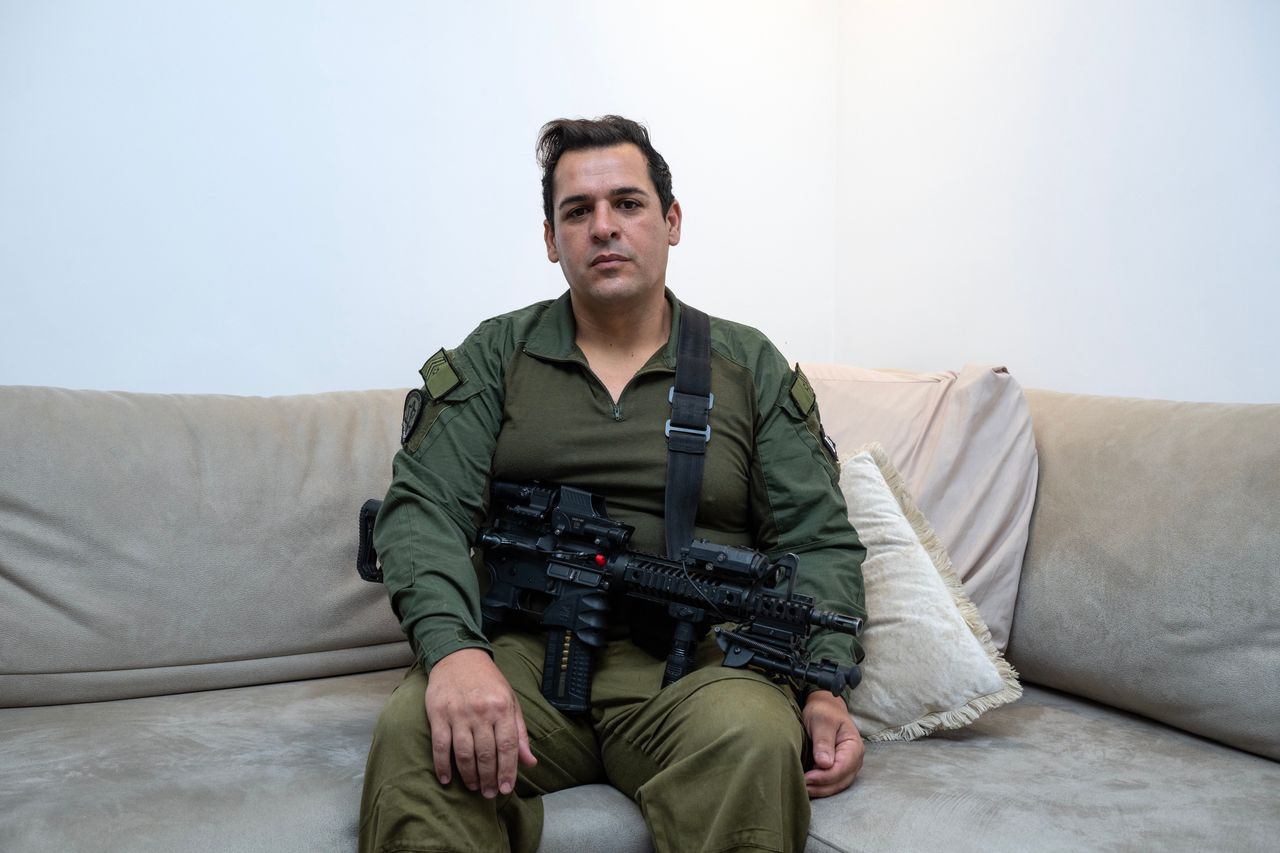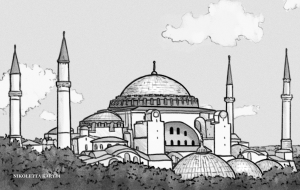A day after Hamas attacked Israel and sparked war on Oct. 7, Adi Hazan drove to a rally point in southern Israel and began what he thought would be one or two months of emergency military-reserve service.
Nearly 10 months later, the machine-gunner is still deployed—and the rest of his life is in shambles. His construction business is failing, he is sinking into debt, and his family relies on handouts from friends and charities. And he doesn’t see an end in sight.
“I don’t know what will happen,” said Hazan, 41, who first served in Gaza and now is in the West Bank, where Israel has funneled troops to clamp down on tensions exacerbated by the war. “No one knew this situation would continue for so long.”
A small nation with fewer than 10 million people, Israel relies heavily on reservists such as Hazan to keep its military functioning in times of crisis.
But now, with the war in Gaza heading into its 11th month, and long-running exchanges of fire with regional militias such as Hezbollah heating up , many of those fighters are close to a breaking point. Exhausted and in some cases demoralized, they are struggling to balance family and work with military service, while the economic toll from their absences mounts.
The strain on military manpower is one reason Israeli officials are hesitant to launch an all-out war against Hezbollah , which would require the same cohort of weary reservists to fight against a military power far superior to Hamas.
It is also exposing longer-term vulnerabilities for Israel as it confronts the possibility of conflicts with hard-to-conquer militias on its borders for years to come.
“Israel did not prepare itself for a long war; we thought about a big strike of the air force and then a fast maneuver by the ground forces,” said former Israeli National Security Council head Yaakov Amidror . “The longer the time, the more problematic it is to maintain the support and the readiness” of the fighting forces.
Built for speed
Historically, Israel has thrived at fighting short wars, during which it can rely on reservists and its overwhelming technological advantages, with firepower such as its squadron of F-35 jet fighters procured from the U.S. It defeated four Arab armies in six days in 1967 and, six years later, needed less than three weeks to repel attacks by Egypt and Syria.
This time is different. Armed militias, funded and trained by Iran, now control swaths of territory neighboring Israel’s. Dislodging them could take years, if it is possible at all. Hamas and Hezbollah have powerful missiles, tens of thousands of trained fighters and significant infrastructure, including tunnel networks , while Iran-backed militias in Yemen, Iraq and Syria also pose threats .
While Israel says the war in Gaza is shifting into a lower-intensity phase, the enclave is expected to be mired in violence and instability for the foreseeable future.
Even if Israel reaches a cease-fire deal with Hamas, it also faces the potential for full-blown war with Hezbollah, a U.S.-designated terrorist group, on its northern border with Lebanon. Israel said it killed one of Hezbollah’s top military leaders in late July in an airstrike in Beirut intended as retaliation for an earlier attack on the Israel-controlled Golan Heights that killed 12 young people.
Exhaustion in the ranks
Rather than develop a professional army of paid volunteers, Israel requires all Israeli Jews to serve in the military, usually upon completing high school. In practice, however, less than half of draft-age Israelis serve. Many Jews secure exemptions for family or religious reasons, and some Arab minorities are also exempted.
That has left the military heavily dependent on reservists, who outnumber full-time soldiers by more than two to one. Typically, they are former conscripts who continue to train and serve about one month annually until they are 40, or 45 for officers.
At the height of the war in Gaza, about two-thirds of Israel’s fighting power was drawn from reservists—some 300,000 drafted reserve personnel, compared with a standing army of around 150,000, security analysts estimate.
Although official figures on current deployments aren’t publicly available, security analysts say the number of reservists deployed has come down significantly. Even so, thousands are still engaged and others say they have been told to be ready to be recalled at a moment’s notice.
Unlike conscripts, reservists are regular citizens who have jobs and are raising families. Many have now served multiple rounds and faced fierce fighting. More than 300 soldiers have been killed and over 4,000 have been injured since Israel started its ground war in Gaza, according to Israel’s military, which doesn’t break out figures for conscripts versus reservists.
Impossible choices
Many reservists have had to shut businesses and delay investments. Nearly 150,000 have missed work days, including many in Israel’s crucial tech sector.
With so many disruptions, the Bank of Israel forecasts that the country’s economy will grow only 1.5% in 2024, after contracting 5.7% in the last quarter of 2023. It says growth should rebound to 4.2% in 2025—but only if the war ends by early next year.
Assaf Mor, 45, says he rushed into action when he was called for reserve duty on Oct. 7. While he fought for 100 days in Gaza, his holistic-medicine business bled cash, teetering on collapse.
During the evening, he would run logistics convoys into Gaza with his unit. In the morning, he would open his laptop at his base and try to work out financing options with his accountant to keep his clinic afloat. Balancing the two ran him ragged.

Assaf Mor says he had to choose between returning to military service as a reservist and keeping his holistic-medicine business afloat. Photo: Tanya Habjouqa/NOOR for WSJ
Some reservists are simply refusing to show up when called. Although that can lead to punishments, including jail time, Israel hasn’t been prosecuting them, because commanding officers are familiar with the stress reservists are under and typically don’t press the matter.
When the army called up Mor again in April, he declined. While he worried he was letting his unit down, he felt like he had no choice but to stay home and fight for his family’s financial survival.
“It’s unbearable, one of the hardest crises I’ve had in my life,” said Mor, who is relying on grants from civil-society organizations as he tries to rebuild his business.
No easy answers
Israeli lawmakers generally agree a fix is needed to meet the military’s needs. Israel’s Defense Ministry is promoting legislation to extend mandatory military service to 36 months from 32, increase annual reserve-duty commitments by 45 days a year and raise the age of obligatory reserve duty by up to five years, and in some cases, to age 52.
But some lawmakers have debated how much to ask from reservists, especially amid concerns that taking people out of work for longer periods would hurt the economy. Israel’s parliament is still debating the proposal.
The potential new demands have also angered Israel’s serving public. Many Israelis would rather see the country expand the pool of people who serve as conscripts. Yet the most obvious way to do that, by forcing ultra-Orthodox Israelis to serve, is potentially explosive.
A recent Supreme Court ruling found there was no legal basis for exempting ultra-Orthodox Israelis, a policy established decades ago to let such men focus on preserving Jewish traditions. The Defense Ministry started sending initial draft notices in July. Ultra-Orthodox Jews are expected to account for 41% of potential draftees by 2050.
For most ultra-Orthodox, however, military service is a threat to their cloistered way of life. Thousands have attended protests against serving . Their political leaders, key to Israeli Prime Minister Benjamin Netanyahu ’s coalition, say they could bring down the government rather than accept mandatory draft quotas.
While that drama plays out, Hazan, the reservist now in the West Bank, said he is feeling more trapped by circumstances.
He initially expected to close his construction business east of Tel Aviv only briefly when he was called up to serve in a unit responsible for evacuating casualties in Gaza.
As his duties have stretched on, he has been unable to resurrect his business. It relies on a staff of 13 Palestinians from the West Bank who were all blocked from entering Israel when the country tightened its borders after the outbreak of war.
Wrapping up his service could bring its own headaches, forcing him to deal with creditors, to whom he says he owes $250,000. He is currently covered by protections afforded to people who are serving.
“I feel that everything is collapsing,” he said. “At the end of the day, I also need to deal with life. I’m not a conscripted soldier—I am a soldier with a family.”
Write to Dov Lieber at dov.lieber@wsj.com



